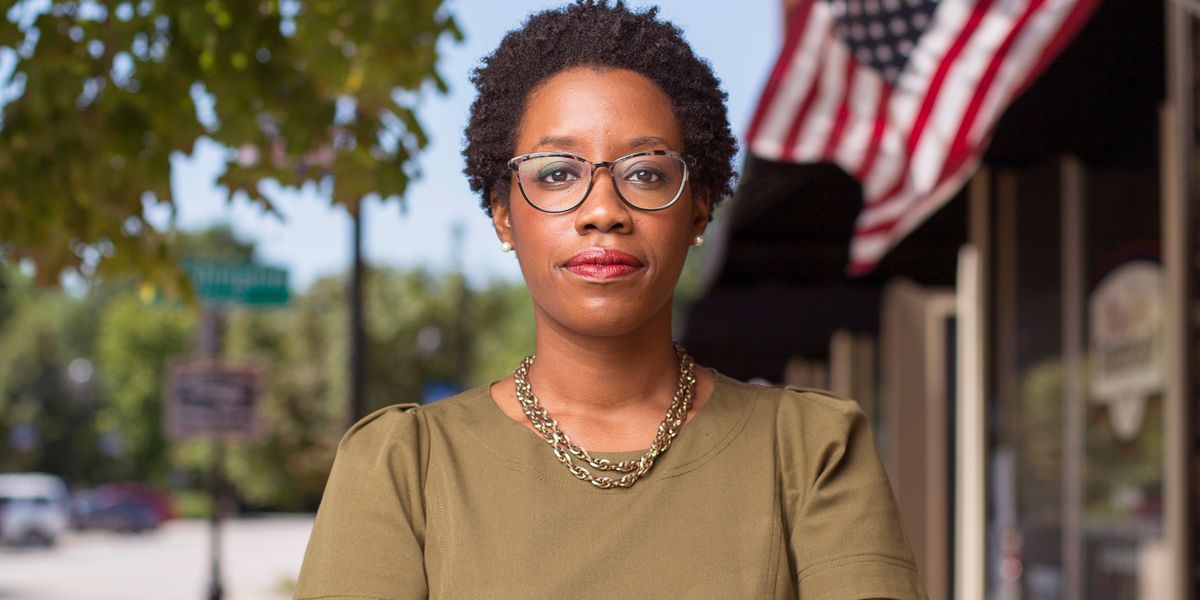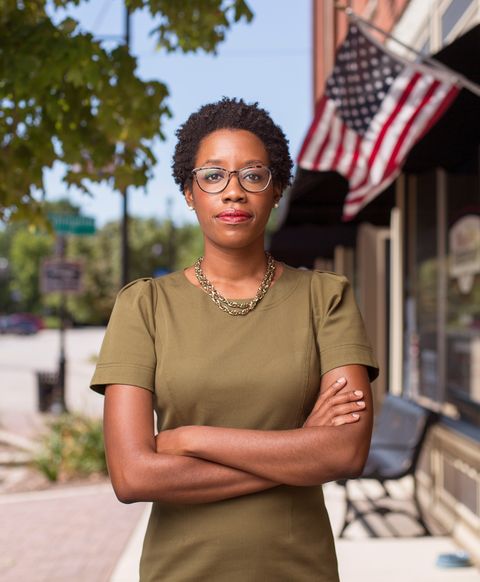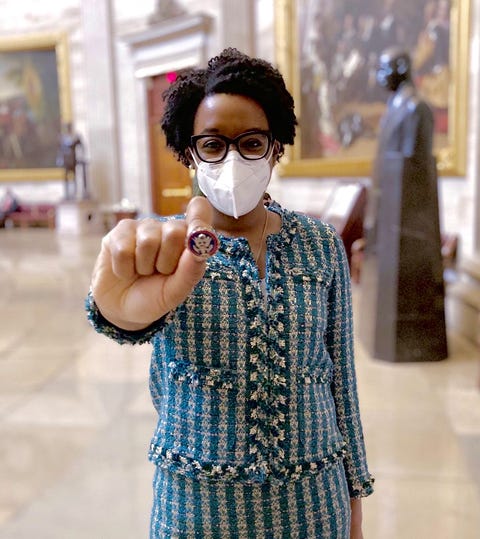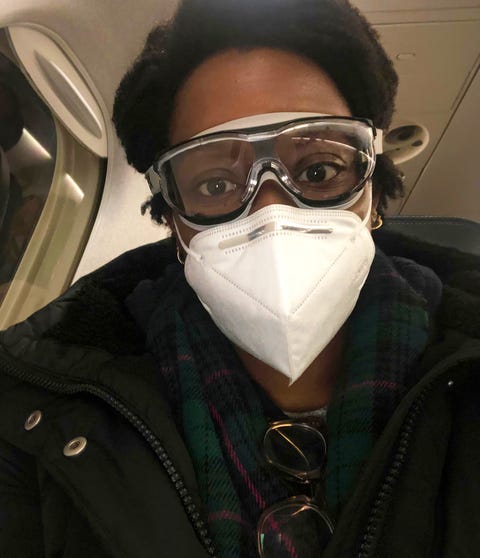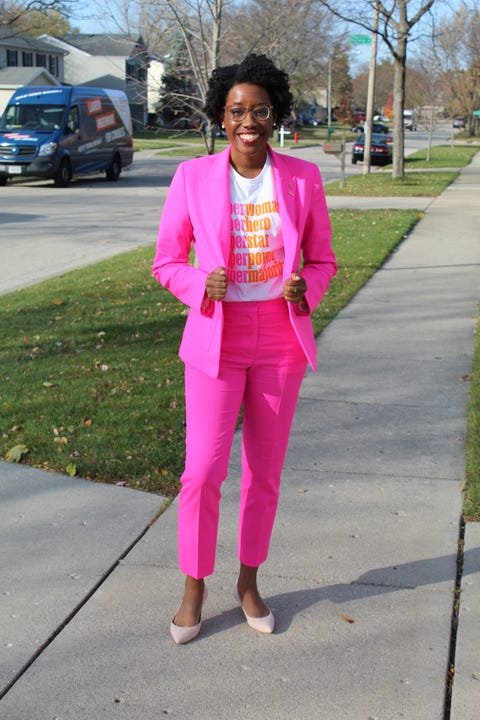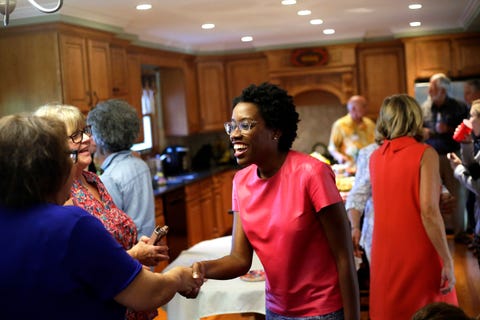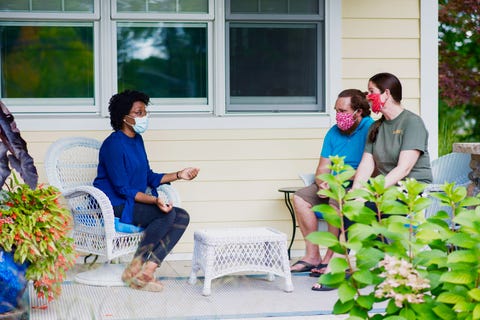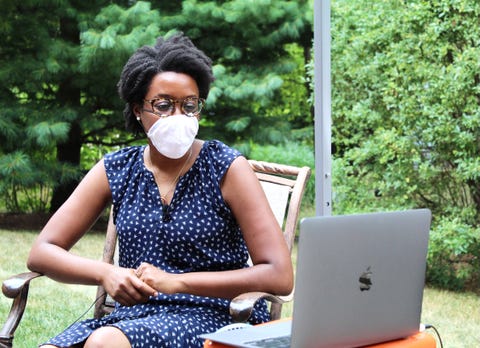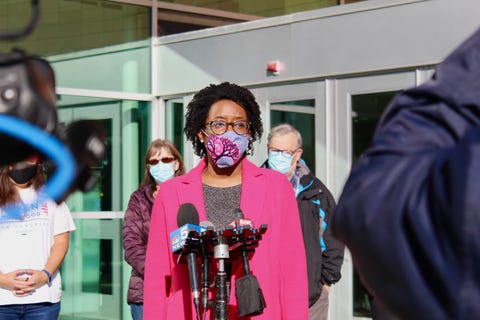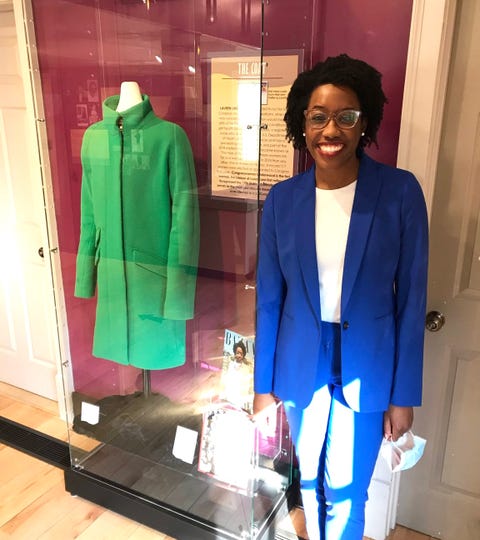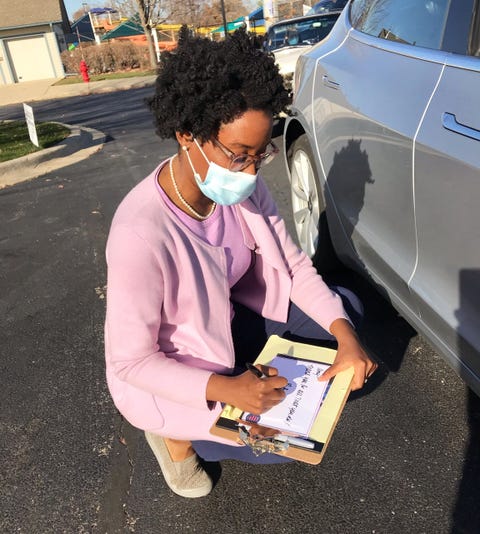Imagine what it must have felt like to be Rep. Lauren Underwood, the youngest Black woman in Congress, on the day when the halls of our nation’s Capitol building were stormed by an angry mob of white supremacist election deniers, some of whom sought to hang legislators by noose on makeshift gallows they had constructed outside.
Underwood had arrived at her office early that morning, after first stopping to receive her second dose of the coronavirus vaccine. She was watching the electoral certification process on TV (not all members attended in person due to the pandemic) when she saw some of her colleagues being rushed off the floor. As the images were playing out onscreen, she says she started hearing loud noises—“bangs or gunshots, almost like cannons”—in the hallway outside. It was only her second time in her new office; she didn’t yet know the escape routes. As she and her chief of staff barricaded the door with furniture, her phone started “making all these noises I’d never heard,” alerting her that nearby buildings had been evacuated due to bomb threats. There was no actionable information, Underwood tells me two days after the attack, just “Shelter in place,” “Stay put,” “Be quiet.”
She ventured into the adjoining empty office of a House colleague so that she could peek into the hallway to see what was going on. Her stomach must have sank when she realized the door had shut behind her, locking her out of her office and leaving her without her phone, computer, and iPad—all of which remained inside. She had only her member pin to identify her.
Underwood was eventually escorted to an undisclosed location, but what should have been a safe space was anything but when she realized the room was crammed full of Republicans who refused to put on masks. It was “the most direct superspreader exposure I had ever been in,” says Underwood, 34. “After all those months of being so careful with COVID…” (She has a heart condition called supraventricular tachycardia and is sure that if she got the virus, “I’d be symptomatic, and it would be rough.”)
For four hours, Underwood and other members were told they couldn’t leave. No bathroom breaks, no food—“you just had to sit there,” she says. She had someone text her sister to say, “I’m with Lauren. She’s in an undisclosed location without her phone. She’s safe.” The sergeant at arms came in after about two hours and said, “We haven’t yet secured the Capitol. We are waiting for reinforcements to arrive.” What? How is this possible? Underwood thought.
Colleagues trickled in, some visibly shaken with harrowing stories of what they had seen and heard. “We were so vulnerable. We were wide open. It’s just, like, the grace of God that it was not worse,” Underwood says. “Not just for us as individual human beings, but for our country. They could have destroyed the legislative branch that day.”
And then, just like that, after about an hour, she was back on the House floor, squabbling with her colleagues about Arizona and whether to throw out its electors. “I felt all the emotions,” Underwood says. “They were attacking our democracy, our Constitution. This was not some small thing. It was not a riot. It was not a difference of opinion, a difference of perspective, or ideas—no, this was something very different from that.”
And frankly, it’s hard for her not to take the attack personally. “You had these folks—terrorists, I call them terrorists—who forced their way into the Capitol, convinced that they had every right to be there with a white supremacy ideology,” Underwood says. “That image of the man with the Confederate flag in the Capitol? It’s just so deeply offensive and un-American,” she continues, viscerally affected by the photograph seared in her brain. “I have had, I would say, kind of a tough time during some parts of my time in Congress. Feeling personally attacked. Feeling personally hunted. This is different. This is bigger than just me. But I’m within a subset of people with extra venom directed my way. That’s how I feel.”
Underwood says she was scared to get on the plane the next morning to fly home with some of the same people who had stormed the Capitol. “They were allowed to walk right out the front door,” she says—and on to her plane. She disguised herself, forgoing what she calls her “typical millennial congressional look” for some “really cool” goggles and a KN95, and pulling the hood of her winter coat tight around her face. “These people are from my community. They know who I am,” Underwood explains. “And what I want people to remember is, Terrorism is designed to instill fear. People asked me, How are you doing? I’m like, ‘It’s terrifying. Literally.’ That underlying terror is there, and it’s omnipresent. While they might not have succeeded in stopping us from executing our constitutional responsibility, that fear has taken root in a real way.”
Like Charlottesville and other painful and heartbreaking moments over the past four years, the insurrection forced us all to confront the very worst elements of our society. “It makes us look at ourselves differently, because this is who we are—or it’s not who we are, but it is who we’ve become,” Underwood says. “How do we fix this as one nation?” I ask her if she has the answer to the question she posed and at first she replies with a defeated-sounding, “No.”
But after a moment of reflection, she points to the one thing she knows best—the thing that got her elected to Congress in the first place—as the likely way forward. “I believe, even with my constituents who are the most ardent supporters of the MAGA philosophy, that they can respect and understand what it means to pledge allegiance to the flag of the United States and what it means to uphold the Constitution,” Underwood says. “While they may disagree with how I choose to exercise that oath, we have not gone so far that we cannot have a conversation.”
Illinois’ 14th Congressional District—the historically Republican northern and western suburbs of Chicago—was never meant to be won by a Democrat. A decade ago, the Illinois Democratic Party redrew the district lines to corral as many Republican votes as possible in the 14th in order to maintain more favorable odds in other districts. The gerrymander was so successful statewide that a Politico reporter quipped that the House Speaker had “punched his ticket to the partisan hall of fame.” But then along came Lauren Underwood.
Back when she was first running for Congress in 2018, there were so many articles questioning whether Underwood, a young Black Democrat running in an overwhelmingly white suburban and rural +5 Republican district, could win that she told New York magazine she stopped reading stories about her candidacy. Yes, the odds were stacked against her—the district had been held by Dennis Hastert, the longest-serving Republican Speaker of the House, for 20 years, and Donald Trump had won it in 2016—but this was her hometown, her lifelong neighbors. And some cities, like Naperville, the state’s third largest city, where Underwood was raised and still lives (around the corner from her parents), had been trending blue in recent years. So how dare the doubters think they knew the voters in the 14th better than she did?
In the end, she proved everyone wrong. In her 2018 primary, Underwood beat out six white men to receive the Democratic nomination, and then she beat a four-term Republican incumbent (also a white man) to win the general election. But it’s how she pulled off her victory that makes Underwood’s win truly remarkable. Unlike some candidates running in purple districts, she didn’t campaign on being a moderate because, well, she isn’t. She ran on an openly liberal agenda, embracing affordable and accessible health care—drawing on her experience as a registered nurse and a former senior advisor at the U.S. Department of Health and Human Services—as well as public education, paid leave, and affordable child care.
And rather than shy away from discussing such topics in certain communities where they might be less favorable, Underwood simply showed up and explained with conviction why she believes the things she believes. “It’s important to remember—number one—folks share values,” she says. “In my community, for example, people believe that healthcare is a human right and it shouldn’t be limited to the wealthiest Americans.” Even the MAGA people, I ask? “Yes, those folks can’t afford their insulin and they’re mad about it,” Underwood insists. “When you talk about how much things cost and who gets it and who doesn’t, the Venn diagram is huge. If we take the time to talk to each other—there are so many people who feel like they haven’t been seen. This is not about policy to me. This is about representation. Do you feel like someone has your back?”
When she went door-to-door, farmers would tell her no Democrat had knocked on their doors in 10 years. And what Underwood says she heard “loud and clear,” from those ruby- red rural parts of her district to the more moderate suburbs, is that both sides felt like no one cared. “No one was showing up for them. No one understood what was going on with their families. No one understood their fears or hopes,” she says. “And so when we literally physically showed up and talked to them, listened and were responsive, and engaged them on the issues that mattered to them, we were able to earn their support.”
The conversations often had very little to do with politics or which side of the aisle she sits on. “I will show up in the smallest town. I have towns with less than 100 households, and we show up and talk to them,” Underwood says. “Their issue may not be healthcare. It might be a problem with their sewer system. Great! That’s not partisan. But no one had bothered to show up for them on that.”
Senator Tammy Duckworth (D-IL) has witnessed Underwood’s ability to connect with voters firsthand. “We did a series of events together where we would sit down at a local shop, and a dozen to two dozen people would come in. It was a very intimate setting, and I was just really impressed by how she was out in the community at a very granular level, talking to people one-on-one,” Duckworth says. “She’s very down-to-earth, very matter of fact, and she really connects with people.”
Underwood doesn’t try to woo voters by claiming she believes in things she doesn’t; she levels with them. “I like to flip it on its head,” she explains. “People are like, Oh, you vote whatever percentage with your party. And I’m like, Well, would you have rather I voted against the Violence Against Women Act to change a percentage? Do you want us not to be in the Paris Climate Agreement? Because let’s talk to my farmers about climate change—they will tell you how it impacts their businesses and their families. So then people are like, ‘No, no, you’re right, you’re right. Just do the right thing.”
Doing the right thing once she got to Congress meant not forgetting about the conversations that got her there, even if the issues weren’t always the most headline-grabbing. “I go hard for my farmers,” Underwood says. It’s why she supported the U.S.-Mexico-Canada trade agreement, and why she pushed for bailout checks. “I fought for those checks, and my farmers knew it,” she says. And remember the MAGA folks pissed off about insulin? She went hard for them, too, writing a bill to reduce the cost of insulin by getting lower-cost, generic insulin to market faster, and fighting for it until it was signed by President Trump.
Such actions don’t necessarily win her social media followers or a posse in Congress, but they did earn her a unanimous endorsement from Illinois Farm Bureau’s political action committee during her reelection campaign, a rarity among Democrats. (In 2018, they endorsed her Republican opponent.) “When I say to my constituents that I am willing to work with the president to deliver for them, I mean it,” she says. “You just have to deliver for people. It’s not about partisanship.”
As Senator Kirsten Gillibrand (D-NY) says, selling a liberal agenda to Republican voters is “all in how you talk about it.” She related to Underwood, having first run for election in a red House district herself. “We’re progressive, but we have some real common sense that allows us to win people over,” Gillibrand says. “We know where the sweet spot is. We know how to be for our progressive values, but also bring people together.” It’s that ability, Gillibrand says, that makes Underwood “the future of our party.”
You might think that all of the above means Underwood sailed to reelection last year, with no challenger in sight. But it was 2020, and nothing followed logical order. Her opponent was dairy magnet Jim Oberweis, then an Illinois Republican state senator, who has run for higher office (U.S. Senate, House, governor) six times and lost. But that doesn’t mean he wasn’t a threat: The Oberweis name has been around a long time, and is very well-known as a popular ice cream business with locations across the district.
Oberweis also has a Trumpian streak: He harnessed his personal wealth to win the primary and spouted baseless, fear-mongering conspiracy theories about Underwood. He even has a second residence in Florida. Add to that the fact that Illinois 14 had never reelected a Democrat to a full term, and once again, the odds were not in Underwood’s favor. “We came into the 2020 cycle knowing that we’re going to have to make history again and knowing that the dynamics of the race were going to be very different,” Underwood says. “The ads from my opponent were so ugly and hateful, just mean-spirited, and just false—let’s also say that.”
When the Black Lives Matter movement took hold this summer, Underwood was heartened by the rallies in her district. “I’ve lived in this community my whole life and growing up, I never had a Black teacher. There was only one other Black kid in my class. So to see our communities step up—I mean, every town and city had a protest, a rally, a march, something—I was so touched.”
But she didn’t dare participate. Her opponent was already pushing the idea that the district “would not be safe with Lauren Underwood in office,” she says. “I knew my opponent was going to weaponize my race in this election, and if he could make me ‘an other,’ like, ‘Oh, is she really from here? Can we really trust her? What’s she really up to?’ Then they would be able to separate me from my accomplishments.”
So she did what she always does: kept talking to people. She held “porch parties,” virtual story times for families, and drive-in rallies, and just hoped that voters would believe what they were seeing right in front of their faces over what they were reading on the internet. “My opponent would come out and say, ‘You need to be scared of Lauren Underwood,’ and people would be like, ‘Well, I just saw her. We know her. She helped my neighbor get back from Haiti during COVID, she helped us get money from our VA benefits, or whatever. That’s what enabled us to break through the noise and pull out ahead—the work we had done.”
Her worst day on the campaign was election night. With mail-in ballots still being counted, Oberweis held a small lead. “In my short time in politics, I have never actually been losing,” Underwood says. “Even in my first primary, we just dominated. It’s been like these fairy-tale stories.” That night, she felt like the fairytale might come to an end. “You know how in movies when something happens and all of a sudden your vision zones out and there’s this ringing in your ears? That’s how I felt.”
On November 8, five days after the election, Underwood pulled ahead. But it would be nine days before the race was called in her favor; in the end, she beat Oberweis by just 5,374 votes. Oberweis attended freshman orientation for the 117th Congress and has filed a “Notice of Contest” with the Clerk of the House of Representatives.
Given all of the election result challenges, Underwood assumed she wasn’t alone in facing an official contest. “I just figured this was happening to a lot of other people because their opponents also hadn’t conceded,” Underwood explains. “But no, just me. And this is not about ‘poor Lauren,’ but it fits a pattern.” Two weeks after she won her first race in 2018, an opponent announced his intent to run in 2020. “Before I was even sworn in, there was someone running against me,” Underwood says. “Now, months after Election Day, my opponent still cannot accept the results.” (She was served the contest paperwork on the morning of the Capitol attack.)
Her opponent’s challenge won’t be successful, but still, such things have a way of making a person feel like they don’t belong. “I feel like I’m in an institution that was not built for me—that my presence is disruptive in so many ways,” Underwood says. “Within a subset of our party there’s this really warm embrace of my candidacy and my service and these ideas that I have envisioned for our country, but at work, it sometimes feels very different. That’s the difference between politics and policymaking—there’s always this tension. Even after this election, I thought we would have more young women of color coming and there weren’t. It’s tough.”
Underwood is doing her part to get more women in the room. She founded the Farm Team PAC to support candidates in Northern Illinois. Twenty-one of the 24 winning candidates she endorsed this past cycle were women. One of them is Maura Hirschauer, a 43-year-old from Batavia, Illinois, who had never been involved in politics until she signed up to volunteer for Underwood’s 2018 campaign. “I had no political aspirations, really, until candidates like Lauren opened the door,” says Hirschauer.
Hirschauer first met Underwood at an event Underwood hosted at the second Women’s March. (Underwood’s mom had knitted pink hats for everyone to wear; Hirschauer’s daughter still wears hers.) “Everything about her was really relatable and reassuring,” Hirschauer says. “When you’re with Lauren, you feel like she’s making really responsible decisions. She’s so thoughtful and has a presence way beyond her years. She will take a stance, but not before she’s weighed all of the pros and cons for the district. And I think that’s why she was able to win.”
When Hirschauer’s daughter, Maggie, who was 10 at the time, wrote a statement saying she wanted to make some changes to active shooter drill procedures in schools, only one candidate heard her out. Oberweis “was incredibly dismissive and intimidating and not open at all,” Hirschauer says, while Underwood invited Maggie to speak at a Capitol Hill press conference on gun violence and school safety.
It was the first time Hirschauer had seen the government really work for the people. She was so inspired that she launched her own campaign for the Illinois House of Representatives—and won. “Lauren is a different type of politician and really opened everyone’s minds to the idea that you don’t have to fit a certain mold to lead,” Hirschauer says. “She made my daughter feel heard, and it was really cool.”
